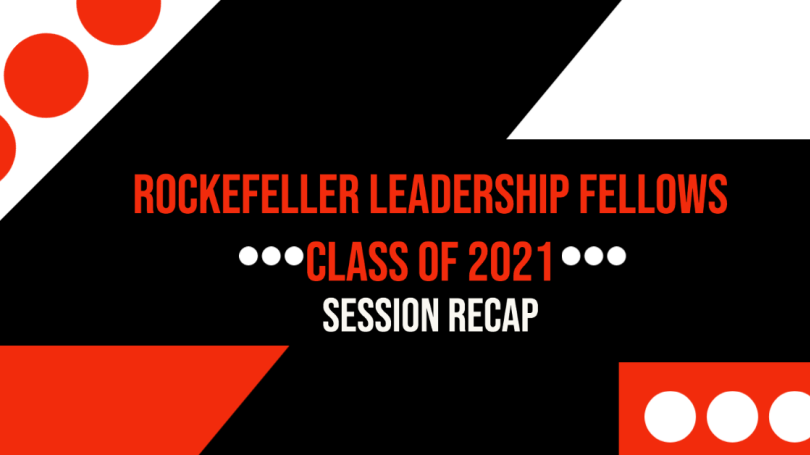
- Public Policy
- Leadership
- Funding
- News & Events
- About the Center
Back to Top Nav
Back to Top Nav
Back to Top Nav
Back to Top Nav
The opening words from Kerry Priest for the seventh session of Rockefeller Leadership Fellows were “leadership is an activity so we can get better at it.” Kerry shared that she views a difference between a leader as a noun and leadership as a verb. To her, the word leader focuses on a person or position–something people “are.” Leadership focuses on people (relationships) and processes (activity)–something people “do.” The entire point of RLF is to develop leadership skills, supporting Kerry’s hypothesis. “Leadership is motivated by challenges and finds opportunities,” emphasizing the courage necessary from future leaders to confront problems.
To locate opportunities for growth and success, Kerry introduced the concept of “the gap.” In this framework, concerns must be defined and aspirations named. Opportunities arise when the gap between concerns and aspirations is adaptively overcome. A good leader is adept at reaching across the gap with creative solutions. Leaders frequently face problems that require these adaptive solutions. To reach these solutions, Kerry said leaders need to be able to move people from status quo by engaging and challenging hearts and minds, beliefs, behaviors. To give the Fellows a chance to practice these skills, she asked the Fellows to determine a problem they are facing, present it to a small group, and then reflect on insights gained from a few minutes of receiving questions from the group without answering. Fellows found the exercise helpful, noting the surprising amount of possibility and potential generated in the short time of the exercise, demonstrating the benefits of the “gap” and adaptive solution strategy offered by Kerry.
By continuing to practice the adaptive solution skills introduced by Kerry, learning to use them with more intentionality, the Fellows could become better and more creative leaders. As the exercise demonstrated, it can be productive to assess challenges and hear potential ways to overcome challenges by approaching it from an outside perspective. These outside perspectives can only be gained by talking through problems with individuals outside your immediate orbit, underlining the importance of maintaining strong, reciprocal relationships through compassionate collaboration and deep listening. By cultivating positive relationships, leaders are able to access help as needed to overcome the gap to reach an adaptive solution.
-Written by Maria Smith-Lopez, Class of 2021 Rockefeller Leadership Fellow and Student Program Assistant
As Rockefeller Leadership Fellows, seniors gain a better understanding of the qualities and responsibilities expected of leaders. As Fellows take part in the workshops, discussions, and team-building exercises, they examine their skills, qualities, and attributes as leaders and analyze how these influence teamwork and achieving goals.